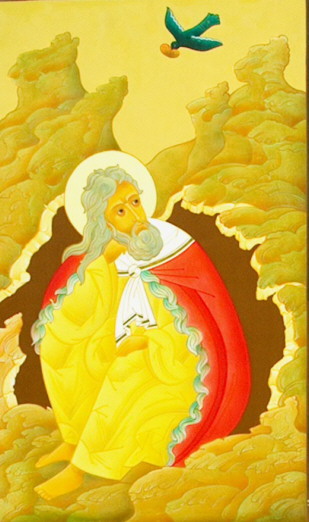|
(see Kings 3 + 4)
 At Thebe in the East Jordan country divided by deep ravines, to the north of the Jabbok River, lay the homeland of one of God's
greatest prophets in northern Israel. We know nothing of his parents or his youth. Suddenly risen from out of the earth, he stood before the godless King Ahab and warded off rain and
damp in his country for many years. Then he disappeared again into the ravine of the brook Karith of which we know not where it flowed into the River Jordan. After a three-year drought, Elias
emerged in the country again. He appeared at first to the surprised Abdias and then, fearlessly, to the king himself. He asked only that the people gather on Mount Carmel to hear a
judgment of the Lord together with the king and the 850 idol Baal priests who had been called into the country, who had tried in vain to obtain a sign from their god in the sky. At Thebe in the East Jordan country divided by deep ravines, to the north of the Jabbok River, lay the homeland of one of God's
greatest prophets in northern Israel. We know nothing of his parents or his youth. Suddenly risen from out of the earth, he stood before the godless King Ahab and warded off rain and
damp in his country for many years. Then he disappeared again into the ravine of the brook Karith of which we know not where it flowed into the River Jordan. After a three-year drought, Elias
emerged in the country again. He appeared at first to the surprised Abdias and then, fearlessly, to the king himself. He asked only that the people gather on Mount Carmel to hear a
judgment of the Lord together with the king and the 850 idol Baal priests who had been called into the country, who had tried in vain to obtain a sign from their god in the sky.
With twelve stones Elijah built the sacrificial altar of the true God and through powerful prayers he called down the all-consuming fire of the true God from the heavens, which opened the eyes of
the king and the people who had for so long been blinded. Elijah had the Baal priests slain and thus was forced to flee Queen
Jezebel’s fatal oath of revenge and to hide in a cave. Then God passed over him, not in a stormy gale or an earthquake or a fire,
but in agentle whisper, and remanded him: not zeal or severity, but goodness and patience would be best to prove his worthiness. All was by far not yet lost in Israel.
He prophesied death to King Ahab and a terrible end for his wife Jezebel and his son, Ohoziah, for they had refused to believe the
prophet's words – and after some years his prophecies were fulfilled.
During this time it came to pass that God called on Elijah to be his pupil and successor. Elijah was a dour,
superhuman, God-fearing man among the prophets of Israel. Lonely he went about his business and alone he
wrangled with hundreds for acknowledgment of the true God in Israel. Lonely too he carried his worries and
wished to die, godforsaken, in the desert. No man since Moses had come as close to God as Elijah. So, as
was Moses, he was allowed to get close to the transfigured Saviour. Miraculously borne away from earth (fiery
chariot with fiery steeds), his coming again to the Messianic court of the last prophet Malachi (4.5f) was
prophesied and already awaited by the people at the time of the Redeemer’s coming.
|